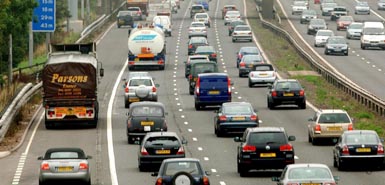Trial could lead to £1.30-a-mile charges

Hundreds of drivers are being recruited to take part in government-funded road-pricing trials that could result in charges of up to £1.30 a mile on the most congested roads.
The test runs will start early next year in four locations and will involve fitting a satellite-tracking device to the vehicles of volunteers. An on-board unit will automatically deduct payments from a shadow account set up in the driver’s name.
Paul Clark, the Transport Minister, confirmed yesterday that the trials would proceed despite previous statements from the Government suggesting that it had abandoned the idea of a national road-pricing scheme. In 2004 a feasibility study considered a range of possible prices, up to £1.30 a mile. It said that the highest rate “would be paid by only 0.5 per cent of traffic”.
The on-board unit could be used to collect all road charges, such as congestion charges in London and Manchester and tolls for crossing bridges and using new lanes on motorways.
In the longer term the technology could be used to introduce pricing on all roads, with the price varying according to the time of day, direction of travel and the level of congestion.
Drivers would use the internet to check all their payments on a single bill. They would choose whether the bill showed where they had travelled or simply the amounts they had paid.
Ministers hope to overcome concerns about loss of privacy by allowing drivers to instruct the on-board unit not to transmit locations to the billing centre but simply the number of miles driven at each charging rate.
The Department for Transport (DfT) has appointed four companies to test different charging systems and a further three companies to test methods of enforcing a pricing scheme and ensuring its accuracy.
The Times has learnt that one of the four trials will involve up to 100 BT staff working at Martlesham, Suffolk. BT is working with T-Systems, the German company that collects tolls from lorries on 12,000 miles of autobahn.
Trafficmaster, a leading provider of traffic information and satellite navigation systems, is running another trial.
The DfT refused to say where the tests would take place, claiming that this was a matter for the companies.
The scheme is costing £4 million in this financial year and spending in future years “would depend on how the project’s requirements evolve”.
A DfT document sent to the companies conducting the trials states: “We need to explore how we might move to a different way of paying for road use: it is clear that any form of road pricing would be more effective if it could target congestion by charging on the basis of when and where a journey is being made.”
Mr Clark said: “Nobody will thank us if, as a Government, we do not look at every option. Any form of road pricing must address people’s concerns around fairness and privacy.
“If we sit back and do nothing you can be sure that economic growth will lead to gridlock.”
Mr Clark said that the trials would help to create a pricing “tool” that was most likely to be used first by local authorities. Manchester is carrying out a referendum on a congestion charging scheme under which drivers would be charged at peak times and in the busiest direction of travel. The result is due on December 12.
Mr Clark declined to say when a national pricing scheme might be introduced, although previous ministers have said that it would take about a decade to implement.
Theoretically the on-board units could be used to detect whether a driver has exceeded the speed limit. Ministers have said that they would not be used for that purpose.
BRITAIN’S FIRST CONGESTION CHARGES
October 2002
Durham introduces a £2 charge on a road leading to the city centre, right, the first of its kind in Britain
February 2003
Ken Livingstone introduces the £5 Central London congestion charge
July 2005
London charge increases to £8
February 2007
London charging zone doubles in size with a westwards extension
May 2007
Manchester announces plans for peak-time congestion charging, under which drivers will pay a maximum of £5 a day to drive in the city from 2013. Residents can take part in a postal referendum on the proposals this month
December 12, 2008
Result to be announced of the Manchester referendum on congestion charging
November 5, 2008
Ben Webster, Transport Correspondent
Source: The Times